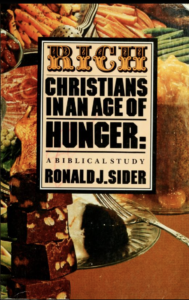Despite his weaknesses and economic errors, Ron Sider was a true believer, one who did not care about being ‘trendy’ or ‘cool’ or appealing to any establishment, whether the ‘woke’ establishment of our society or the bourgeois establishment of the Evangelical churches.
I was saddened to learn about the death last summer of the Evangelical Christian activist and author Ron Sider (1939–2022). I’ve always found his ideas thought-provoking and have agreed with him in somewhat unexpected ways.
In the first years after I came to Christ at age 23, in the peak year of the Jesus Movement, 1973, I had been taught that the main obligations of a Christian were to maintain one’s private devotions or ‘quiet times’, to attend and be involved in a church [though this was sometimes less important than the ‘quiet time’], to avoid sexual sin, to reach out and be a positive witness among one’s peer group, and to support world missions. We were in the middle of the first energy crisis, but nothing was said from the pulpit about good stewardship and conservation of energy. That was, I guess, ‘worldly’ or something. As a child, I had heard in Sunday school that Christians were to be interested in the poor and in foreign lands [however, I did not learn why I needed to trust Jesus. That had to wait until the Jesus Movement].
From Concern to Action
 Into the midst of this contented Evangelical world came Ronald J. Sider, reminding many of us in Rich Christians in an Age of Hunger (1977) that a lot of the world is hungry and poor—including a lot of Christians overseas—and that we affluent Western Christians ought to take heed and make sacrifices on their behalf.
Into the midst of this contented Evangelical world came Ronald J. Sider, reminding many of us in Rich Christians in an Age of Hunger (1977) that a lot of the world is hungry and poor—including a lot of Christians overseas—and that we affluent Western Christians ought to take heed and make sacrifices on their behalf.
Sider was a serious, young, Canadian-born American who ironically bore a striking resemblance to the comedian Woody Allen. Earlier in 1973, Sider met with a group of Evangelicals. The group included older-generation leaders, such as Carl F. H. Henry and Frank Gaebelein, and younger ministers such as John M. Perkins. They drafted and issued “The Chicago Declaration of Evangelical Social Concern” to address political and social concerns, including racism and poverty. In 1978 Sider went beyond ‘concern’ and launched Evangelicals for Social Action.
As Sider himself admitted, he was not much of an economist. His reasoning was sometimes faulty; for instance, he would say, “A higher minimum wage automatically benefits everyone.” Not quite. A high minimum wage can price certain young or unskilled people, who badly need work experience, out of the market. It can also impose a cost burden on marginal small businesses, frequently run by people of color or unaffluent people. Meanwhile, big corporations can more easily bear the cost.
Although Sider supported a ‘welfare state’, in his view, members of the Christian Church still had a duty to care for the poor of their communities. But he made it clear that he did not support state socialism.
Anabaptist Theonomist
As a good Anabaptist, with roots in the Mennonite tradition, Sider also opposed the death penalty, as well as any hawkish foreign policy. These are positions that have always been held by some Christians. As I understand Anabaptist views, they generally regard the state as a necessary evil, and ask, at best, for exemptions from the military draft or any sort of government service. But to engage in political advocacy for their preferred policies is not historically Anabaptist; the Anabaptists thought that the state could not be redeemed or sanctified.
Sider also drew some of his arguments from the Old Testament, such as laws concerning the Jubilee. He also recognized God’s express concern for the poor in the Law. The term ‘theonomist’ has been applied to those who desire to enact Old Testament biblical law in contemporary legal systems. Perhaps it may be said that Sider’s efforts to enact Anabaptist moral views in the state was kind of a ‘theonomization’ of Anabaptist views.
Courageous in the Face of Pressure
Sider was a real believer. While some on the ‘Evangelical left’ had a disordered emotional theology, leading them to abandon the traditional Christian sexual ethic, Sider would not do so. He supported the Manhattan Declaration, drafted by Chuck Colson, Robert P. George, and Timothy George in 2009, which calls on all Christians to remain firm in their opposition to abortion, same-sex ‘marriage’, and threats to the freedom of religious conscience.
Occasionally he turned his proverbial guns leftward and criticized his ‘progressive’ political allies for their erroneous worldview. He also rejected some of the main ideas that motivated his political co-belligerents: the universal ‘parenthood of God and the sibling-hood of humankind’, as we call it now [what it was called in the old days is politically incorrect now]. And he denied the goodness of human nature versus the evil of society, along with the idea that the social justice millennium must arrive before we personally can be expected to behave properly.
Despite his weaknesses and economic errors, Ron Sider was a true believer, one who did not care about being ‘trendy’ or ‘cool’ or appealing to any establishment, whether the ‘woke’ establishment of our society or the bourgeois establishment of the Evangelical churches. The world, especially the Christian world, needs more people with the courage of Sider to stand against the pressures of conformity that take down so many people today.
This post originally appeared in the January-February 2023 issue of Touchstone Magazine and it is reposted here with permission.




